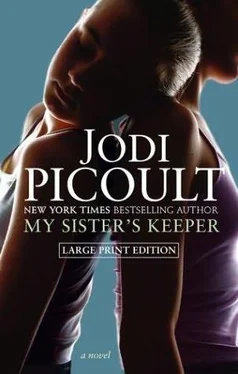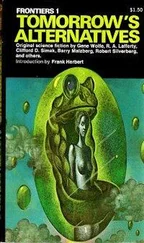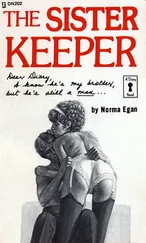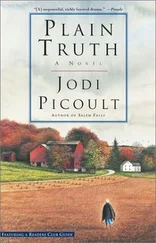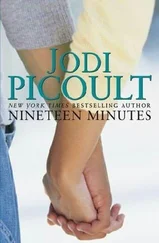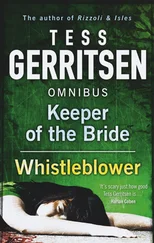She can't go back to school yet, so we get her lessons sent home. Once or twice she has come with me to pick Anna up from kindergarten, but refuses to get out of the car. She will troop to the hospital for her routine CBC, but if I suggest a side trip to the video store or Dunkin' Donuts afterward, she begs off.
One Saturday morning, the door to the girls' bedroom is ajar; I knock gently. "Want to go to the mall?" Kate shrugs. "Not now."
I lean against the doorframe. "It'll be good to get out of the house."
"I don't want to." Although I am sure she does not even realize she is doing it, she skims her palm over her head before tucking her hand into her back pocket.
"Kate," I begin.
"Don't say it. Don't tell me that nobody’s going to stare at me, because they will. Don't tell me it doesn’t matter, because it does. And don't tell me I look fine because that's a lie." Her eyes, lash-bare, fill with tears. "I'm a freak, Mom, Look at me."
I do, and I see the spots where her brows have gone missing, and the slope of her endless brow and the small divots and bumps that are usually hidden under the cover of hair. "Well," I say evenly. "We can fix this."
Without another word, l walk out of her room, knowing Kate will follow. I pass Anna, who abandons her coloring book to trail behind her sister. In the basement I pull out a pair of ancient electric grooming clippers we found when we bought the house, and plug them in. Then I cut a swath right down the middle of my scalp.
"Mom!" Kate gasps.
"What?" A tumble of brown waves falls onto Anna's shoulder; she picks them up delicately "It’s only hair."
With another swipe of the razor, Kate starts to smile. She points out a spot that I’ve missed, where a small thatch stands like a forest. I sit down on an overturned milk crate and let her shave the other side of my head herself. Anna crawls onto my lap. "Me next," she begs.
An hour later, we walk through the mall holding hands, a trio of bald girls. We stay for hours. Everywhere we go, heads turn and voices whisper. We are beautiful, times three.
There is no fire without some smoke
—JOHN HEYWOOD, Proverbs
DON'T DENY IT—you've driven by a bulldozer or front-end loader on the side of a highway, after hours, and wondered why the road crews leave the equipment out there where anyone, meaning me, could steal it. My first truck jacking was years ago; I put a cement mixer out of gear on a slope and watched it roll into a construction company's base trailer. Right now there's a dump truck a mile away from my house; I've seen it sleeping like a baby elephant next to a pile of Jersey barriers on 1-195. Not my first choice of wheels, but beggars can't be choosers; in the wake of my little run-in with the law, my father's taken my car into custody, and is keeping it at the fire station.
Driving a dump truck turns out to be a hell of a lot different than driving my car. First, you fill up the whole freaking road. Second, it handles like a tank, or at least like what I suppose a tank would handle like if you didn't have to join an army full of uptight, power-crazy assholes to drive one. Third—and least palatable—people see you coming. When I roll up to the underpass where Duracell Dan makes his cardboard home, he cowers behind his line of thirty-three-gallon drums. "Hey," I say, swinging out of the cab of the truck. "It's just me."
It still takes Dan a minute to peek between his hands, make sure I'm telling him the truth. "Like my rig?" I ask.
He gets up gingerly and touches the streaked side of the truck. Then he laughs. "Your Jeep been taking steroids, boy."
I load up the rear of the cab with the materials I need. How cool would it be if I just backed the truck up to a window, dumped in several bottles of my Arsonist's Special, and drove away with the place bursting into flames? Dan stands by the driver's-side door. Wash Me, he writes across the grit.
"Hey," I say, and for no reason except the fact that I've never done it before, I ask him if he wants to come.
"For real?"
"Yeah. But there's a rule. Whatever you see and whatever we do, you can't tell anyone about it."
He pretends to lock up his lips and toss the key. Five minutes later, we're on our way to an old shed that used to be a boathouse for one of the colleges. Dan fiddles with the controls, raising and lowering the truck bed while we're tooling along. I tell myself that I've invited him along to add to the thrill—one more person who knows only makes it more exciting. But it's really because there are some nights when you just want to know there's someone else besides you in this wide world.
When I was eleven years old I got a skateboard. I never asked for one; it was a guilt gift. Over the years I got quite a few of these big ticket items, usually in conjunction with one of Kate's episodes. My parents would shower her with all kinds of cool shit whenever she had to have something done to her; and since Anna was usually involved, she got some amazing presents, too, and then a week later my parents would feel bad about the inequality and would buy me some toy to make sure I didn't feel left out.
Anyway, I cannot even begin to tell you how amazing that skateboard was. It had a skull on the bottom that glowed in the dark, and from the teeth dripped green blood. The wheels were neon yellow and the gritty surface, when you stepped on it in your sneakers, made the sound of a rock star clearing his throat. I skimmed it up and down the driveway, around the sidewalks, learning how to pop wheelies and kickflips and ollies. There was only one rule: I wasn't supposed to take it into the street, because cars could come around at any minute; kids could get hit in an instant.
Well, I don't need to tell you that eleven-year-old budding derelicts and house rules are like oil and water. By the end of my first week with this board I thought I'd rather slide down a razor blade into alcohol than tool up and down the sidewalk yet one more time with all the toddlers on their Big Wheels.
I begged my father to take me to the Kmart parking lot, or the school basketball court, or anywhere, really, where I could play around a little. He promised me that on Friday, after Kate had a routine bone marrow aspiration, we could all go out to the school. I could bring my skateboard, Anna could bring her bike, and if Kate felt up to it, she could Rollerblade.
God, was I looking forward to that. I greased the wheels and polished up the bottom of the skateboard and practiced a double helix on the driveway ramp I'd made of old scrap plywood and a fat log. The minute I saw the car—my mom and Kate returning from the hematologist—I ran out to the porch so we wouldn't waste any time.
My mother, it turned out, was in a huge hurry, too. Because the door to the van slid open and there was Kate, covered with blood. "Get your father," my mother ordered, holding a wad of tissues up to Kate's face.
It wasn't like she hadn't had nosebleeds before. And my mom was always telling me, when it freaked me out, that the bleeding looked way worse than it actually was. But I got my father, and the two of them hustled Kate into the bathroom and tried to keep her from crying, because it only made everything harder.
"Dad," I said. "When are we going?"
But he was busy wadding up toilet paper, bunching it up under Kate's nose.
"Dad?" I repeated.
My father looked right at me, but he didn't answer. And his eyes were dazed and staring through me, like I was made out of smoke.
That was the first time I thought that maybe I was.
The thing about flame is that it's insidious—it sneaks, it licks, it looks over its shoulder and laughs. And fuck, it's beautiful. Like a sunset eating everything in its path. For the first time, I have someone to admire my handiwork. Beside me, Dan makes a small sound at the back of his throat—respect, no doubt. But when I look at him, proud, I see that he's got his head ducked into the greasy collar of his army-surplus coat. He's got tears running down his face.
Читать дальше
